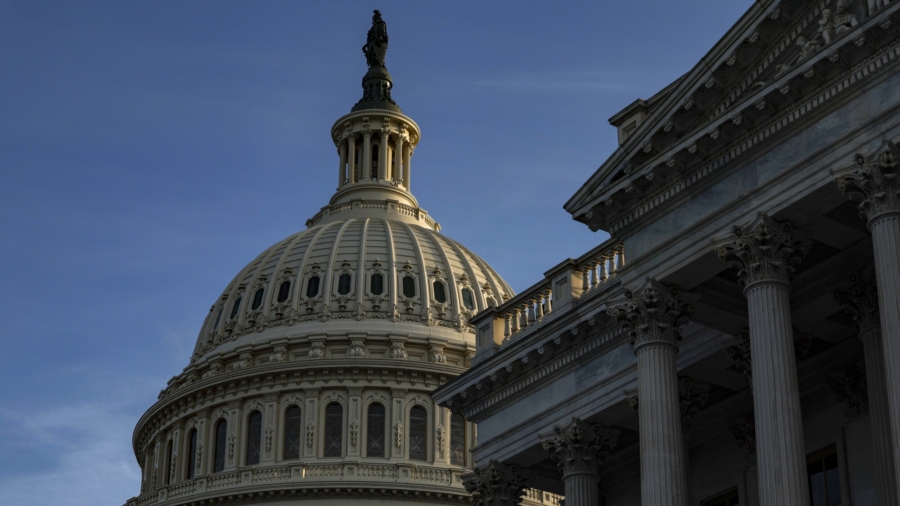The U.S. Senate on June 23 voted to break the filibuster on a controversial gun deal hammered out between Republicans and Democrats, clearing the way for its final passage.
The bill, as with most bills in the Senate, needed the support of at least 60 lawmakers to overcome the filibuster threshold and close out further debate.
The bill overshot this threshold by a substantial margin, winning the support of all 50 Democrats and 15 Republicans.
In addition to Senate Minority Leader Mitch McConnell (R-Ky.), Sen. John Cornyn (R-Texas), and Sen. Thom Tillis (R-N.C.)—all of whom were instrumental in negotiating the deal—the other 12 Republicans who joined Democrats in support of the bill are Sens. Roy Blunt (R-Mo.), Richard Burr (R-N.C.), Bill Cassidy (R-La.), Susan Collins (R-Maine), Joni Ernst (R-Iowa), Lindsey Graham (R-S.C.), Shelley Moore Capito (R-W.Va.), Lisa Murkowski (R-Alaska), Rob Portman (R-Ohio), Mitt Romney (R-Utah), and Todd Young (R-Ind.).
With the successful cloture vote, the bill will now go to the floor for a final vote on the Senate floor, where it is likely to pass by the same margins.
The bill, coming in the wake of a school shooting in Uvalde, Texas that left 19 children and two adults dead, has received mixed reactions on Capitol Hill.
Some provisions have broad bipartisan support.
For example, the bill would allocate $15 billion to mental health care access and increasing school security, a measure that was particularly popular among Republicans. To offset these costs, the bill delays the implementation of a Medicare drug rebate program that proponents say will save the federal government $21 billion.
However, other measures, including measures to close the so-called “boyfriend loophole,” measures incentivizing states to adopt red-flag laws, and increasing background check requirements, have proven more controversial.
The bill won the support of both GOP Leader McConnell and Senate Majority Leader Chuck Schumer (D-N.Y.).
The bill, McConnell said, rejecting the concerns of members of his party who opposed the bill on gun rights grounds, will “protect the Second Amendment rights of law-abiding citizens.”
Later, McConnell added that the bill “does not so much as touch the rights of the overwhelming majority of American gun owners who are law-abiding citizens of sound mind.”
The package, McConnell said, is full of “common sense and popular solutions to make these horrific incidents less likely.”
“This is real progress,” Schumer said of the bill. “It will save lives.”
Republican Opponents Criticize ‘Constitutional Deficiencies’
In a Twitter thread, Sen. Rand Paul (R-Ky.), a staunch Second Amendment advocate, excoriated several provisions of the bill.
“No one wants to see guns in the hands of criminals, and no one wants to see tragedies like we saw recently in Texas,” Paul wrote. “I’m both a law-abiding gun owner, and a parent, and I want our schools and kids safe.
“While we have many laws in place to do that already, there should be things we can agree on as legislators to improve upon this. For example, I support legislation to include juvenile records of violent crimes to be included in background checks.
“Looking at the recent criminal past of anyone is a good idea before assessing gun ownership. However, that idea was paired with many questionable or bad ones in this legislation.
“I am concerned about constitutional deficiencies in many red flag laws,” Paul wrote.
Red flag laws, laws that enable courts to strip people of their constitutional rights to own a gun, have been a rallying cry for Second Amendment advocates for some time. The controversial laws have resulted in thousands of Americans being ordered not to possess guns because of concerns about their mental health.
Often, the accused are not given notice of an accusation or any chance to defend themselves against the charges until after their weapons have been confiscated.
“I cannot support any legislation that funds or encourages laws that allow ex parte gun confiscation without legal representation, or even sometimes without prior notification to the defendant of any accusation at all,” Paul wrote.
He continued: “I cannot support legislation that funds or encourages laws that allow gun confiscation with a standard lower than the constitutional criminal standard of ‘beyond a reasonable doubt.’ I cannot support legislation that funds or encourages gun confiscation predicated on anonymous accusations.”
On June 21, all 50 Democrats in the upper chamber were joined by 14 Republicans in advancing the bill, setting it up for a final vote later this week. The vote came only an hour or so after the final text of the bill was made public and available to lawmakers.
Hasty Passing
Now, just two days after the text of the bill was released, it is poised to pass the Senate.
“Unfortunately, this legislation was assembled as many are—in secret, absent well placed leaks to journalists,” Paul said, wrapping up the thread. “There doesn’t’ appear to be a willingness or time provided to read, understand, debate or amend this bill.”
The same criticism was repeated by Sen. Josh Hawley (R-Mo.) in a June 22 tweet.
“Here we are voting to move on a bill negotiated entirely behind closed doors, released only an hour ago, that no one has had time to fully read, that ignores the national crime wave & chips away instead at the fundamental rights of law abiding citizens. NO,” Hawley wrote.
From The Epoch Times

